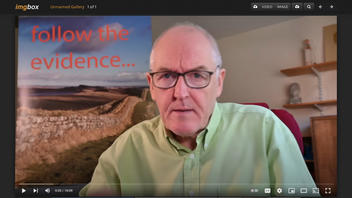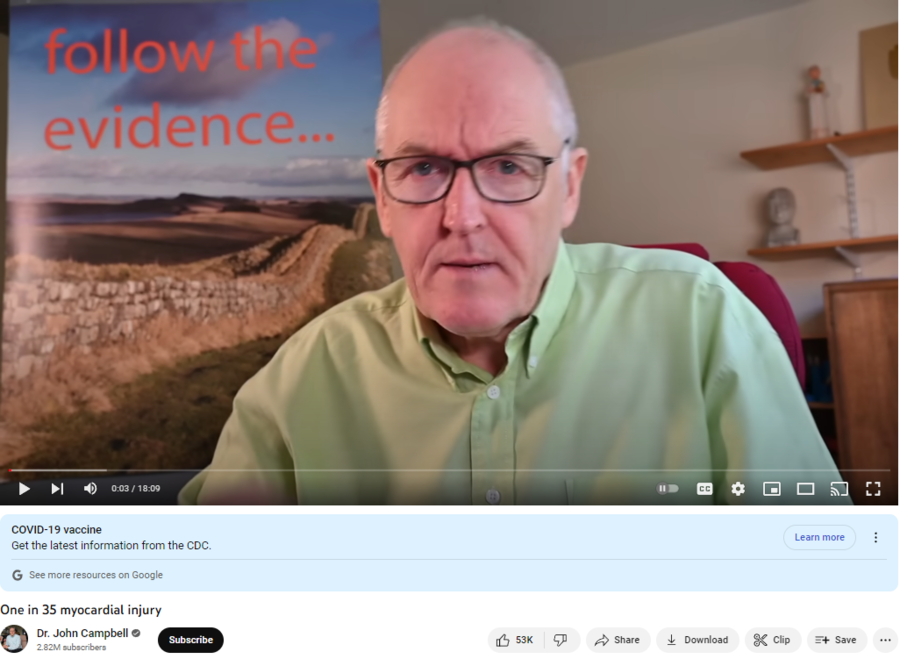STORY UPDATED: check for updates below.

Did one in every 35 people who received a Moderna COVID-19 mRNA-1273 booster vaccination suffer myocardial injury? No, that's not true: There is no reliable evidence or data to support this claim. Such a high rate of adverse reactions would be highly unusual and would likely have resulted in widespread concern and investigation. The authors of the study cited to make the claim also downplayed the risk, saying "all cases were mild with only a transient and short period of myocardial injury."
The claim appeared in a video on YouTube (archived here) published by John Campbell on July 26, 2023, under the title "One in 35 myocardial injury." Just a few seconds into the video, Campbell opens his case by saying:
Now, if regulators around the world don't take notice of the information I'm about to give via this paper, then they are best, in my view, negligent. At worst, I don't even want to think about it.
After Moderna booster vaccines in a trial done in Switzerland, there were 777 working people followed up with 777 controls. Five-point-one percent of those who had the booster vaccine had increased troponins, indicating cardiomyocyte damage. So, 5.1 percent increased cardiac marker damage chemical in the blood.
Two-point-eight percent of the 777, that's one in 35, one in 35, had vaccine-associated myocardial injury. Quite astounding and incredible.
This is what the post looked like on YouTube at the time of writing:
(Source: YouTube screenshot taken on Fri July 28 17:45:30 2023 UTC)
Definitions
Campbell uses a few terms non-medical professionals might not be familiar with: troponins and cardiomyocyte damage.
Troponins are proteins that are released when the heart muscle has been damaged. Troponin levels can be measured in the blood and can be an indication of heart damage if the levels are high enough. Other activities can increase those levels as well.
Cardiomyocytes are the cells responsible for the contraction of the heart, so in layman's terms, cardiomyocyte damage is damage to the heart muscle.
Cardiologist
Unlike Campbell, Dr. James de Lemos, an American Heart Association expert and chief of the Division of Cardiology at UT Southwestern Medical Center in Dallas, does not see the findings of the study as "Quite astounding and incredible." In a July 31, 2023, email to Lead Stories, he described the elevation of troponin levels recorded after the booster vaccine as "trivial."
This finding does not surprise me at all and doesn't do anything to change my assessment of risk/benefit of [the] vaccine. These small troponin elevations are not likely events of clinical significance.
In a July 31, 2023, phone interview with Lead Stories, Dr. William Schaffner, a professor of medicine in the division of infectious diseases at Vanderbilt University Medical Center, called Campbell's characterization of the Swiss study "not helpful" and "inaccurate."
Regulators all around the world have recognized, and it's been widely publicized both in the lay literature and certainly in the medical literature, that these vaccines, on occasion, are associated with clinically important myocarditis. ... So, the information about myocarditis has been out there and explicitly defined and widely publicized since the first time it was described.
The American Heart Association defines myocarditis as a serious though rare condition where inflammation develops in the myocardium or middle muscular layer of the heart wall.
The study
The study, or trial as Campbell calls it, was published in the European Journal of Heart Failure on July 20, 2023, under the title "Sex-specific differences in myocardial injury incidence after COVID-19 mRNA-1273 Booster Vaccination." While Campbell calls the results something regulators need to take notice of lest they be "negligent," the authors of the paper see it differently. The study's conclusion said:
... mRNA-1273 vaccine-associated mild transient myocardial injury was found to be much more common than previously thought. It occurred in one out of 35 persons, was mild and transient, and more frequent in women versus men. Neither anti-IL-1RA, nor pre-existing vaccine/infection-induced immunity or systemic inflammation seemed to be dominant mechanisms of myocardial injury. No participant developed MACE [a major adverse cardiac event] within 30-days.
The "Discussion" section of the study added:
[A]ll cases were mild with only a transient and short period of myocardial injury ... No patient showed ECG changes and, no patient developed MACE within 30 days.
The study authors describe any vaccine damage to the heart as "mild and transient," meaning it's not severe or permanent. Additionally, no one who took part in the study had a MACE within 30 days of receiving their COVID booster shot. MACE is defined as a non-fatal stroke, non-fatal heart attack or cardiovascular death.
The study also said, "No patient showed ECG changes." An ECG, or electrocardiogram, is a test that records the electrical activity of the heart.
Study author
Lead Stories reached out to lead study author Dr. Christian Mueller, head of Clinical Research and Stationary Cardiology at University Hospital Basel, to see if Campbell's analysis correctly interprets their findings. It does not. In a July 31, 2023, email, Mueller said the study speaks for itself but added:
Unfortunately, even now in Summer 2023 it seems difficult to have a balanced discussion on this side effect [myocardial injury]. Some people as the ones you cite massively exaggerate, others completely ignore it. Clearly, both reactions do not seem appropriate from my perspective. This research should help and will help manufacturers in the formulation of even safer vaccines by avoiding or at least reducing the prevalence of this side effect.
In all, 22 out of 777 people in the study showed evidence of "vaccine-associated myocardial injury."
Dr. James Lawler with the Division of Infectious Diseases at the University of Nebraska Medical Center told Lead Stories in a July 28, 2023, email that troponin levels used to measure heart damage are highly sensitive and can jump or fall quickly. He continued:
Ultimately, all of these were mild elevations ... and most seemed to revert to normal quickly. And only two appeared to have any potential clinical relevance, meaning they at least met a weak definition of myocarditis - but with no evidence of significant injury or impairment. That was 2 out of 777 total participants (or 0.26%).
Schaffner told Lead Stories that his takeaway from the study was that any myocardial injury was "mild, temporary and totally without symptoms." He added:
In other words, nobody would have known about this if the study hadn't been done.
Centers for Disease Control and Prevention
In a July 28, 2023, email to Lead Stories, the Centers for Disease Control and Prevention (CDC) provided this response to Campbell's claim in the video. The agency said:
CDC and FDA [U.S. Food and Drug Administration] are conducting the most comprehensive vaccine safety surveillance for COVID-19 vaccines in recent history, using multiple complementary surveillance systems (VAERS, VSD, CISA, v-safe and v-safe Pregnancy Registry). To date, no evidence indicates an association between COVID-19 vaccines and heart disease, nor that COVID-19 vaccines predispose to heart attack. ...
CDC studies have shown that there was a small but increased risk for myocarditis, or inflammation of the heart muscle, following mRNA-based COVID-19 vaccines following the second vaccine dose among adolescent and young adult males:
- in males aged 12-15 years 70.7 cases per million doses of Pfizer,
- 16-17 years 105.9 cases per million doses of Pfizer, and
- 18-47 years between 52.4 and 56.3 cases per million doses of Pfizer and Moderna, respectively.
Approximately 96% were hospitalized, 87% of whose symptoms had gone away by the time they were discharged from the hospital. Non-steroidal anti-inflammatory drugs (589/676, 87%) were the most common treatment.
Additionally, the CDC said:
Data have shown that myocarditis occurs no more frequently after booster mRNA COVID-19 vaccination (monovalent or bivalent) than after 2nd dose of primary series mRNA COVID-19 vaccination.
Food and Drug Administration
The FDA also responded to a Lead Stories request for a response to the Swiss study and the Campbell video. In an August 1, 2023, email, the agency said it "generally does not comment on third-party studies," but was aware of the concern about myocardial injuries. The response continued:
To date, the systems in place to monitor the safety of the COVID-19 vaccines authorized or approved for use in the U.S. have identified several health problems potentially associated with vaccination. These include myocarditis and pericarditis following the Pfizer-BioNTech, Moderna, and Novavax COVID-19 vaccines. The chance of having this occur is very low. As soon as the FDA became aware of the risks of myocarditis and pericarditis and determined that there was reasonable evidence of a causal association with the mRNA COVID-19 vaccines, a Warning was included in the Fact Sheets.
The FDA published a benefit-risk assessment, examining the advantages of COVID-19 cases, hospitalizations, and deaths averted versus the instances of myocarditis/pericarditis cases, hospitalizations, and deaths caused by the vaccine. The analysis revealed that the benefits clearly outweighed the risks.
Vaccine vs. disease
Although vaccination has potential risks, for the majority of people, it's safer than getting the disease itself, in this case, COVID-19. A CDC study published in September 2021 looked at the relationship between COVID-19 infection and myocarditis and found that patients with COVID-19 had 16 times the risk of myocarditis as patients who did not have COVID-19, with the level of risk varying by sex and age
In the conclusion of his email response, Lawler said he found the data from the study "reassuring," not concerning:
The mRNA COVID vaccine that we know is effective in preventing severe COVID (and we know already has a clear association with myocarditis at a relatively comparable rate to other vaccines) do not produce widespread indications of concerning myocardial injury in the population studied.
One of those other vaccines associated with myocarditis is for smallpox. Schaffner said the benefits of the shot were worth it:
There are previous studies, now 20-25 years ago, with smallpox vaccine, and it also was associated with myocarditis. Of course, that vaccine was good enough to eradicate smallpox from the world. So, we did pretty well with that vaccine, despite the fact that it occasionally caused myocarditis.
Ultimately, de Lemos said, the conclusions of the Swiss study were "overplayed":
The principle conclusion -- that if you look really hard for minor amounts of injury after vaccination you can find it -- is likely true.
About John Campbell
John Campbell is a popular YouTube host with more than 2.8 million subscribers to his channel. Campbell is not a physician but a retired emergency department nurse. According to the "About" page on his YouTube channel, his Ph.D. "focused on the development of open learning resources for nurses nationally and internationally." Since starting his channel in 2007, he has posted thousands of videos on a variety of medical topics but has focused primarily on COVID since the start of the pandemic, promoting unproven treatments like Ivermectin, spreading misleading death statistics minimizing the number of victims and misinterpreting data about vaccine safety.
Campbell's YouTube channel's about page (archived here) features a disclaimer saying:
These media including videos, book, e book, articles, podcasts are not peer-reviewed. They should never replace individual clinical judgement from your own health care provider. No media-based material on this channel is suitable for using as professional medical advice. All comments are also for educational purposed only and must never replace advice from your own health care provider.
Additional Lead Stories fact checks about Campbell can be found here.
Additional Lead Stories fact checks of claims related to vaccines can be found here.
Updates:
-
2023-08-01T15:04:09Z 2023-08-01T15:04:09Z Adds context from the U.S. Food and Drug Administration.


















